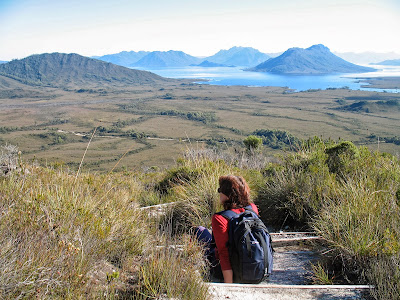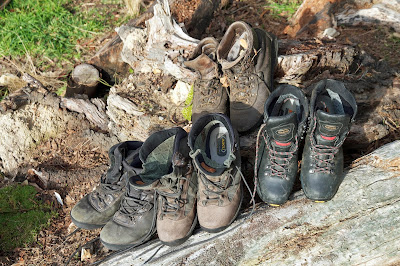 |
[A day walk in SW Tasmania: would I manage overnight walking?] |
So, you’re thinking of taking up bushwalking. Okay, you
may call it tramping, hiking, or hill walking, but it’s really the same thing. It’s
about strapping on a back-pack and boots, and getting out into the countryside for
a good long walk.
In this case I’m talking about the multi-day version of
bushwalking, the sort that is likely to require a tent. As it’s at the
dedicated end of the walking spectrum, I thought you really should know a few
things before you take it on.
1) You
will be part of a strange, eccentric, oft misunderstood minority group.
Think I’m exaggerating here? Try this quick test. How
often do you see bushwalkers in the print and electronic media? And in what
contexts? Are they happily going about their enjoyable pastime? Or are they
being rescued by helicopter from some dire precipice? Or are they being castigated
for having the wrong gear; for following the wrong procedure; for not using –
or using – a personal locator beacon?
You see, as a bushwalker, you are by definition taking the
road less travelled. And it’s certainly not the road taken by the average TV
camera person or reporter. They’ll only come out and film you/write about you
when something has gone badly wrong.
Of course you may be among those who’ve come to accept
that there’s more to life than what’s shown on the small screen. But still,
it’s a little galling to be considered in the same class as Morris dancers,
trainspotters and Mormons. I’ve recounted one of my own frustrating/amusing experiences
with the media before here http://www.naturescribe.com/2011/08/passionate-pedestrian.html
2) You
are going to know pain and discomfort.
Let’s not pretend that bushwalking can be made easy.
That’s what footpaths – or better still escalators – are for. If you’re happy
with where those can take you, then don’t take up bushwalking. Bushwalking
almost inevitably involves going up hill and over uneven ground. And if it
doesn’t then it involves the kinds of bogs, swamps, and jungles that are found
on flat ground.
Carrying your own food, kitchen, clothing, accommodation
and bedding on your back was never going to be easy. Even with all the best
gear, carrying that lot up hill will be a workout. Some people go to gyms to
get similar amounts of sweat going. Me? I prefer doing it in the great
outdoors. But I’m not pretending that there won’t be blisters, cramps and even
the odd tantrum or tear, along with the sweat.
 |
[Getting to the top isn't always easy: Lk Seal Lookout, Mt Field NP] |
3)
Despite the pain and discomfort, you will find that you’ll want to bushwalk
over and over again.
Yes, there’s an upside. Once you find that, you’re hooked
for as long as your will and your body hold together, perhaps even longer. The
numerous health benefits; the subjection to staggering beauty; the bonding with
friends and family; the overcoming of challenges; the views from the top; the potential
depths of reflection, of conversation; the wonderful taste of wild water, and
of (some) food: all of these things and more are some of the reasons walkers
come back again and again.
They deserve several blog posts of their own, but here are
two previous attempts. http://www.naturescribe.com/2009/12/why-we-walk.html
4) You
will become very familiar with a great deal of weather.
Weather forecasts will never quite be the same again.
You’ll either be reading the meteorological tea leaves because you’re about to
go walking, or because you’re wondering how great/terrible the weather would be
if only you were about to go walking.
And once you’re out there, there’s little you’ll be able
to do about the weather, other than go with it. That level of humbling, by the
way, is no bad thing (see previous point).
5) You
will never EVER have a fully satisfactory set of gear.
Some will tell you that bushwalking is quite an
inexpensive pastime. Certainly you can
get inexpensive gear, or even buy it secondhand. But be warned that you will
not only face the ignominy and discomfort of gear failure (yes, cheap generally
means nasty here), you will also face the scorn of the gear freaks.
They are other walkers – probably the majority of other walkers – who have researched their gear
purchases long and hard. They’ll forget your name as soon as you tell them, but
they will NOT forget the six or seven adverse findings they once read about
your particular brand of pack (or tent, or cooker, or walking poles).
 |
[20 years worth of boots: Not finished yet!] |
Eventually you will find that your funds start being
directed towards improving your kit. While this starts off as a perfectly
rational desire for comfort or safety or lighter weight, it subtly, bit-by-bit,
turns into an expensive keep-up-with-the-Joneses game. You’ll willingly play
along, partly because gear is actually – on occasion – improved through
research, but partly because it’s actually both fun and addictive. Like the
surfer, you will live in the hope that somewhere just over the horizon is the
perfect wave (or pack, or tent or cooker).
6) You
will never EVER get to the end of your list of places to walk.
This is not the same as the previous point, because it’s
actually verifiably true. I have lived and walked in Tasmania for 33 years, and
have been walking here that whole time. Yet there is not the slightest chance
that I will walk every track that there is in this tiny State. Each walk
becomes the genesis of the next, as you inevitably talk to your mates about
where to go next, or to other walkers about the walks they’ve done.
Have I mentioned other parts of Australia or the world
yet? Australia is vast; New Zealand is full of mountains and tracks, and that’s
just the local neighbourhood. Enough said. Rejoice in making a list the bottom
of which you will never reach.
 |
[There IS walking elsewhere, like in the French Alps] |
7) Your
vocabulary will start to include strange and obscure words.
If clag, gaiters, spondonicles, bivvy bag, Gore-tex and long-drop
don’t mean much to you, don’t worry they will! If you thought eVent meant some kind of happening; that Tyvek
was used in building; that a spork was something out of Star Trek; or that
whisper-lite meant you’d barely be able to hear it, then you have a bit to learn.
And that’s not to mention the strange accents you may pick
up while bushwalking. If you’re anything like my walking companions and me, you
may have different accents for different phases of a walk. We generally start with
a faux-Irish accent, transition through a kind of Welsh-Pakistani-Pirate-ese,
and head towards Russian, especially when faced with a difficult uphill
section.
8) You
may learn a lot about yourself and your walking companions.
Apart from picking up their accents, you are also likely –
for good or ill – to share in their sense of humour, their dining preferences,
their walking styles, their walking kit, and hints of their bodily functions that
are stronger-than-you’d-like. This is, as they say, character building.
Of course the main aspect of character building will be
what goes on inside your own head. It’s never only about what the landscape or
the weather – or your companions – throw at you. It’s also about how you
respond to it all. Bushwalking as self-help? Therapy even? You could do a lot
worse.
9) You
may learn a lot about this earth; its rocks, plant and creatures; and possibly
even the universe.
Unless you walk with your eyes and ears closed, you will
soon get in touch with the planet you’re lucky enough to be exploring on foot.
If you have a little curiosity, you may find out some details of what it is
you’re seeing, hearing, touching.
Keep that up for a few years and you’re liable to learn quite a bit.
After a few nights under the Milky Way, transcendence might steal up on you. At
the least you may be prompted to ask a few of life’s deeper questions. Like the
origins of all this, and your own place in it all. Dizziness will sometimes
ensue, but don’t worry: this is normal. Keep looking; keep asking; keep
wondering. There are few better things to do.
 |
[A wedge-tailed eagle provides a transcendent moment on Mt Rogoona] |
So there you are. You can’t say you weren’t warned. Bushwalking
is not something to be taken lightly. If I had to sum it all up, I think I’d
probably just say that bushwalking is actually quite a bit like life. It isn’t
easy, but it’s certainly worth the effort.
No comments:
Post a Comment